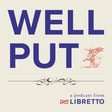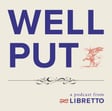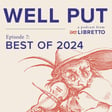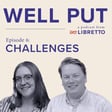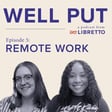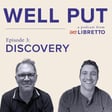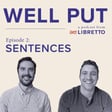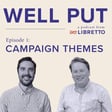Become a Creator today!Start creating today - Share your story with the world!
Start for free
00:00:00
00:00:01

Episode 4: Libretto Then and Now
After almost 28 years, what's changed and what's stayed the same at Libretto? How is the business of communications different today than it was in 1996? The firm's newest employee, Madison, sits down with founder and president Neal to discuss how the firm has evolved.
Hosted by Neal Kane and Madison Hunt
Produced by Tiffany Carlson
Edited by Connor Ferguson
Music by Coma-Media, via Pixabay
© 2024 Libretto. All rights reserved.
Recommended
Transcript
Introduction to Well Put Podcast
00:00:18
Speaker
Welcome to Well Put, a podcast about communications for mission-driven organizations from Libretto. I'm Neil Cain, the founder and president of Libretto. And I am Madison Hunt, the Creative Associate at Libretto.
History and Growth of Libretto
00:00:31
Speaker
Today, Neil and I are going to be talking about the history of Libretto and how the company has grown and evolved since 1996 and where we are today. So my first question for you, Neil, is what inspired you to start the firm in 1996 and what was the original vision you had for the company?
00:00:48
Speaker
And, you know, since it's progressed, how has that vision changed since its inception? So I actually started working as a freelance writer well before i the firm became known as Libretto. And it was just kind of, it was like Neil Cain writer.
00:01:07
Speaker
And then over time, i had an intern and then another intern and then a part-time employee and then a full-time employee. And there are times when I'll say, know, I must have passed out. And when I came to, I had a company. So it was never, it was never,
00:01:26
Speaker
It was always kind of reactive and sort of organic in terms of how things evolved.
Naming and Identity of Libretto
00:01:32
Speaker
And the desire to become libretto actually came to the point where I had, like I said, I had ah an employee named Nancy Farris, who's one of our...
00:01:43
Speaker
the great librettists of all time. And we just decided to make more sense to take the focus away from the name and ah make it more of an organization, which is kind of much more my orientation anyway. And I always had the name, I'd had the name in the back of my mind,
00:02:02
Speaker
for a while and I was really excited to have the chance to use it.
Vision and Values of Libretto
00:02:08
Speaker
And you know, another thing that um relates back to the vision idea was at one point in early in my freelance career, again, well before libretto ever came into existence,
00:02:24
Speaker
I was talking to somebody who was a designer who actually went on to have a really, really big career, very successful career. And he had said to me, you know, what's what's the vision for your practice?
00:02:35
Speaker
And I had never really given it a great deal of thought. And in the moment, I just said, i want to do big projects with nice people. And the weird thing about it, Madison, is like,
00:02:48
Speaker
To a large degree, that is still kind of the intent today.
Madison's Journey into Communications
00:02:53
Speaker
yeah i think that we attract a certain kind of project that usually has some nuances and some quirks to it and is complicated and really interesting and ah you often connected to organizations that are you know focused on improving the quality of life through education or health care or you know social services or other areas.
Advice for Aspiring Communicators
00:03:20
Speaker
So I guess I would ask you as follow on to that, just to tell us a little bit about how you came to libretto and what that process was like.
00:03:34
Speaker
And if you learn anything from that process that you might want to share with others who are looking to either break into the communications field or kind of evolve,
00:03:46
Speaker
um their career status by working in communications? Yeah, so I have a background in journalism. For those of you who don't know, I've been writing for five years.
00:04:00
Speaker
And when I wanted to transition into a new field, you know communications was the first thing that came to mind because I still wanted to improve my writing, but not stop it completely.
00:04:12
Speaker
so I say it in a way where libretto kind of fell into my lap because I was looking for jobs in this industry and a recruiter actually reached out to me and told me that, hey, we have this communications firm who is looking for a new associate who aligns with your skill set. So why not apply?
00:04:32
Speaker
And at first I was a little hesitant because, you know, I haven't done a communications job before. Most of my writing is related to journalism. So i was a little intimidated.
00:04:44
Speaker
But however, i think, you know, learning about libretto, um understanding that the organizations that you work with, that is something that I'm passionate about. Like my background is working with nonprofits.
00:04:57
Speaker
and bettering them and just getting their stories told. um So I think that's kind of, and I hate to say it how it sounds, but libretto really did fall into my lap ah a year ago, a little over a year ago, actually. um And I would say for anyone who is looking for career opportunities and communications,
00:05:17
Speaker
um You know, just go for it. Make sure you work with organizations that align with your skill set and also your goals. You know, again, i think the biggest part of moving into libretto was I wanted to improve my writing and I wanted to be able to write in a different way that also helped people.
Changes in the Communications Landscape
00:05:36
Speaker
So I think if you are looking for new jobs specifically in the communications field, also be very open and, you know, adaptable to what the communications firms have to offer to you, but also what you have to offer to them. You know, I also had to go outside of my bounds a little bit with my skill set.
00:05:58
Speaker
You know, I couldn't write one specific way because it doesn't work for everybody. I couldn't present you know, the projects that we worked on, whether it be messaging or working at like writing a case statement, you know, sometimes I had to go outside of what I already knew, which means maybe doing a little bit more research, understanding who our clients are, and really coming into terms with what they need instead of what I think that they need.
00:06:26
Speaker
Yeah, and I would just add to that. um I think your experience has been shared by others where we really are a niche firm and you know we do a certain kind of communications for a certain kind of client with a certain kind of focus. And and it's in a way, it's it's quite specialized.
00:06:48
Speaker
But I think for people who are looking, you know, people who like to sort of play in the verbal sandbox all day long, it's a really interesting opportunity.
00:07:01
Speaker
ah Of course, it's a great group of people. And it's also, ah we we're dealing with a lot of organizations that are, know, dealing with things like immigrant rights and climate change and, you know, providing...
00:07:15
Speaker
educational opportunities for first generation students say and conservation. Those things are all interesting to learn about and certainly, i think, worth um worth supporting.
00:07:27
Speaker
Yeah, of course. And I think, you know, ah you touched a little bit on, you know, the different ah organizations that you work with. I think that in terms of like my last answer, you know, being adaptable and working with so many different clients, you also are open to like ah an entirely different world.
00:07:45
Speaker
because it's very different from journalism than it is. um But I think also in that you're learning how to communicate with different people that you may never have come across in different industries.
00:07:57
Speaker
So I think that's something that I would also tell people, if anybody who's looking for a career opportunity in communications, you know be open to it because you never know who you're gonna meet and what you're gonna learn.
00:08:08
Speaker
And I guess like my follow up question, you know, looking at the communication landscape back in 1996, which is the year that I was born, um you know, looking at where we are now, you know, how did that shape your initial strategies and
Strategic Insights from CEO Interactions
00:08:25
Speaker
services? And I guess like a follow up question to that was, you know, what were some of the key pivotal moments in the firm's early years that, you know, contributed to its growth and success?
00:08:38
Speaker
Yeah, well, as i as I mentioned before, you know, um my freelance work goes back even well well before 1996. And ah there are there are a couple of global trends, I'd say, that have affected both, obviously, my career and the work that we do. So to give you one example, like, in you know, in the eighty s um technology companies would produce a lot of collateral, what they call collateral, right which is basically print material like brochures and things like customer stories. And they were always print because they were they were not being deployed digitally at that point.
00:09:17
Speaker
And ah so it was more, i don't know if there was more of a paper orientation, but there was also, ah you know, things like personal computers, really, in the like in the mid 80s, which is when I started, late eighty s were just kind of coming into their own.
00:09:34
Speaker
um And so there was a lot of work in technology. And another kind of niche that we found starting in the late 1990s was that companies then would produce annual reports that were again printed and were very elaborate.
00:09:50
Speaker
And they were you know shared widely with start with shareholders. because that was the most definitive narrative retelling of what an organization had been through in the past year and what it was focusing on for the next year.
00:10:09
Speaker
And what would happen is because I was in those scenarios kind of tasked with writing the CEO's letter, I would sometimes spend four hours or six hours even with a CEO putting that material together.
00:10:23
Speaker
And it's that's actually more time than almost any of their employees would spend with them. So it was a really great insight into how strategy drives operations and how that relationship between an individual who's really setting the tone for an organization and the influence that they have.
00:10:44
Speaker
And it's funny, you're making me think of um a, um there was a CEO named Frank Ngari, who's a great, amazing technology executive, super interesting guy at a place called Shiva.
00:10:56
Speaker
And we were talking about his, their annual report one year, and he paused, he said, you know, I hope you know that you're you're so much more than than a writer. Like you are a really good writer, but you really see things within a strategic context and you sort of connect the dots.
00:11:15
Speaker
And I was kind of like, because I've never it' I'd never had an MBA and I'd never I'd never really been that interested in like business books or kind of the sort of the business world as sort of an industry per se but I was very interested in how organizations function and how individuals influence them.
00:11:37
Speaker
So that was also a point where I really started to think that like, you know, ah Our practice can be about the content piece and the writing piece, but can also be about the context piece.
Translating Journalism to Communications
00:11:47
Speaker
And that's something that, again, i still find just ah absolutely fascinating to this day.
00:11:56
Speaker
So I actually wanted to follow up with you a little bit more on the journalism piece. And maybe if you could talk a little bit specifically about how the kinds of skills you have to cultivate for journalistic writing, which ones of those carry over into your work at Libretto?
00:12:16
Speaker
And what are some of those maybe somewhat unfamiliar areas that you need to explore because of the kinds of projects that we do? Yeah, so when I think about my journalism background, i think it gave me a strong foundation in you know storytelling, um research, you know reporting clear and concise. So really writing from the perspective of other people.
00:12:43
Speaker
Journalism is also about networking as well. So you talk to a lot of people, you get a lot of different perspectives, which I think translated over to libretto a little bit. um But I will say the new skills that I've had to hone in on at Libretto is brand voice, you know, writing um from the seat of someone, you know, for example, we were trying to get a campaign going for Handel and Haydn and putting myself in the position of someone who
00:13:16
Speaker
has been ah at H&H for years now and also understanding why it's so important um and also just trying to you know speak directly to their target audience, I think, was a new skill that i wasn't ah familiar with before.
00:13:36
Speaker
um I also think I learned to think more strategically about content in general, trying to learn how content fits within, you know, this broader campaign or case statement.
00:13:50
Speaker
That is something that I was never privy to in journalism. I also feel that in journalism, you have to take yourself out of your writing, where here I've learned that that's exactly what I'm supposed to be doing.
00:14:03
Speaker
I can write in a way that conveys, you know, how I how I feel specifically. um But yeah, i think that's one of the biggest things you know, I wasn't able to put myself in my own writing.
Balancing Rational and Emotional Communication
00:14:18
Speaker
I had to go to a bunch of different people and get their opinions, but I wasn't allowed to express my own unless, you know, I was doing an opinion article, but that was far few in between.
00:14:28
Speaker
um So I think those are a couple of the new skills or techniques that i needed to develop and at like have been developing since I've been at libretto.
00:14:39
Speaker
those Those are great examples. And it reminds of something, um excuse me, that I sometimes say to people, which is yeah writing skill is half the job and the other half is empathy and emotional intelligence.
00:14:53
Speaker
And we talked about this in our episode about interviewing where, and I think I mentioned when I was talking to Ian that you know we were working with some folks on some messaging for hospice and visiting nurse association.
00:15:08
Speaker
And so I would I would, you know, began my interviews with those that group by talking about my parents experience in hospice and how important that was. And again, it's more it's not it's not making it it's not making story about yourself. Right. But it's also is to say, i want to talk to you about this in a human context.
00:15:27
Speaker
rather than like ah literally a clinical context or a sort of object purely objective context. And we talk all the time about, you know, and emotional and rational levers.
00:15:39
Speaker
And, you know, if you're if you're going to support an organization that, um you know, that works to secure civil rights for immigrants, for example,
00:15:50
Speaker
you know like Why is that important? And why is an organization focused on that worthy of support? And yeah what are you doing with the resources that you have?
00:16:05
Speaker
And those are all ah legitimate questions and they have they have nuanced answers because, again, ah you know, we I sometimes talk about we worked with a ah private school where there are a lot of parents who were quite affluent.
00:16:22
Speaker
And so when we were working on their campaign, they were interested in the strategy of the campaign and they wanted to know where the money was going to go. you are people going to get to get a return on their investment and You know why are we focusing on this set of priorities?
00:16:36
Speaker
And it was their seven and eight year olds. So they're totally of this totally emotional connection at the same time. So the idea of like, it's a rational argument or it's an emotional argument. It's it's both.
00:16:49
Speaker
simultaneously And that's an interesting thing to try to calibrate. And it's also really complicated, right?
Importance of Empathy and Listening
00:16:55
Speaker
Because you can't just be sharing data and you can't just be talking about feelings.
00:17:02
Speaker
So how do you find the balance? And and that is something that yeah involves just a lot of listening. And and ah the other thing I would just add is it's also a lot of um intellectual curiosity, you know, because i in many situations, i don't know if this is true for you, but I try to say,
00:17:19
Speaker
you know, if I was learning about this international conservation organization, what would I want to know? Or we're but're starting to work with a group that it's the North, sort of the North American division of an international conservation group. And it's like, again, how does that relate to the, like the parent group?
00:17:34
Speaker
And, ah you know, like, how can you have impact donating? How can you have global impact when you make a donation to this American sort of organization? And,
00:17:47
Speaker
And, you know, again, it's we I've said this before also, it's about if you if you think about the things that you're you don't know and that you're curious about, that can drive a lot of the conversation and and ah elicit some really interesting responses from folks.
00:18:03
Speaker
Yeah, of course. I think, you know, you touched a little bit upon the listening part and going back to, you know, my journalism background, you had to do a lot of listening, but it wasn't, you also touched upon like relating to it, where I feel like in journalism, it just stopped at listening and you just heard from your sources, but you couldn't relate to them.
00:18:24
Speaker
And, you know, just talking about my experiences in the last, a year here, you know, working with BC High, that is a school that's a Catholic school. That's something that I've endured most of my life. You know, i could relate to the students who, you know, admire their air education, love the community that they're involved in.
00:18:45
Speaker
in their school. And that was something that I when I was interviewing students there, you know, I can relate to them. It's like, yes, I went to St. John the Baptist and then I went off to St. John's University in New York.
00:18:58
Speaker
So I think that's the distinction between, you know, when you said empathy, that's a word that has stuck with me. And, you know, being able to understand different perspectives and points of views has been something that I've had to hone skills on where I'm not just saying, oh, well, these are facts, but these are how people feel.
Building Libretto's Client Base
00:19:20
Speaker
And this is going to impact a lot of people's lives in the process. So I think that's the little bit of the distinction between journalism and my work here. um But just going off of that, you know, with libretto, you've talked a lot about the different organizations that you've worked with.
00:19:36
Speaker
um And, you know, from its inception until now, you know, how did you go about building, you know, your initial client base to the one that you have now? And what were some of the first big projects or clients that helped establish your reputation?
00:19:53
Speaker
Yeah, so a couple of examples come to mind. um A lot of the work, in particular back then, because because it wasn't really a digital world, most of the work we did was with designers. So be we'd be to the doing the the word part and they'd be doing the images the imagery and the and the graphic design part.
00:20:10
Speaker
And so, I mean, for example, there is a um a designer named Nancy Skolos, who's now on the faculty at the Rhode Island School of Design. And ah she got in touch with me about writing the capabilities brochure for Hasbro, the toy company.
00:20:27
Speaker
Mm-hmm. And it was just a fit. I mean, it's just kind of a dream project, just fantastic, playful. And the irony was, it's essentially, the irony was that never got produced.
00:20:39
Speaker
But the experience of doing it and even having that as a sample to show, it sort of says, you know, it the stuff really built on itself. Like if someone has entrusted you do this piece and the piece turns out great, you're going to get referred. So.
00:20:53
Speaker
One of the major changes for the firm was that I mentioned Nancy Farris, we were invited to do a project for ah Arts at MIT. and We didn't really do academic work. and I said, oh, it's going to be very bureaucratic and the budget's going to be as good. and She was like, we are so bidding on this. and We got the project. and um and i remember we came up with the theme for the arts program, which is reprogram yourself, Arts at MIT.
00:21:23
Speaker
And another one of the themes was bring your trumpet because people thought that MIT, oh, it's all just science and technology. And in fact, there's a very robust arts program there that tons of students participate in and do great, interesting stuff.
00:21:36
Speaker
So they were really interested in surfacing that. And then we did an annual giving program for ah Wellesley College ah with a woman named Sue Grossel, who we still work with, who she's now at MIT, just awesome, awesome client.
00:21:50
Speaker
And then, yeah, I think we did a project at Harvard. So then when we go to other schools, people would say, so do you have any experience in working in education? And I would, Madison, I would literally say, well, we've only worked at a few schools.
00:22:04
Speaker
It's just only Harvard, MIT, and Wellesley College. And anyone at almost any school would be like, okay, you're hired. And it's funny because you wouldn't you wouldn't think that you know it seems so kind of hierarchical in a way but it it i will say having done we've done tons of work at mit and you know those are folks who have high expectations around creativity and unconventional thinking and getting across this sense of science and technology and everything else at mit and um and honestly being able to work with pretty much anyone they want
00:22:42
Speaker
So, you know, those kinds of projects do, they do have this kind of, you know, can have almost kind of a snowball effect. And sometimes, or sometimes it'll be, we'll work with, you know, have a good experience with someone at one organization or a school and they go to another school and we work with them there. In fact, one of our clients we've actually worked with at his last four, four jobs. Yeah.
00:23:05
Speaker
So and I think that's why, you know, you make the investment to um be conscientious and i don't know if it sounds cheesy, but like to behave with integrity, ah to to to work from a place of goodwill.
00:23:23
Speaker
ah I have to say for me, humor, good humor is a huge piece of that. And again, you know excellent writing skills are totally part that.
00:23:37
Speaker
And I think it's also just... Again, knowing who you are. And I mean, there's there's there's a consultant who had referred us for tons of work. And she would she said to me when she goes, when I talk to people, I say, you know, Neil is not for everyone.
00:23:52
Speaker
And so there's partly a know thyself quality to it where, you know you're not going to be suited for everything. You're certainly not going to win everything. And you have to have you have to be philosophical about that.
Diversity and Inclusion at Libretto
00:24:05
Speaker
um And, ah you know, you have to just to the extent possible, do work that is both meaningful and that sustains the business.
00:24:26
Speaker
So Neil, living in this day and age, you know, we have become a so very socially conscious society. So how does your firm implement and adapt to evolving ideas about diversity inclusion?
00:24:43
Speaker
And what specific strategies do you use to ensure your clients messages resonate authentically with their audiences? ah Such a great question and such an important question. And it's funny.
00:24:55
Speaker
I was just thinking about when I mentioned this guy, Frank Angari at Shiva in the 80s. And he was the head of, he was an executive at Lotus, which is a major, major software company. And we were talking one day and he mentioned this guy.
00:25:12
Speaker
And he said, you know, I don't know. Do you know so and so? And um ah and he's a gay guy And I went, I know him.
00:25:23
Speaker
and of course, what I realized what I'm doing at the time is like I'm like coming out to like one of the biggest executives in the state, which at the time. was not something you did like kind of abruptly.
00:25:37
Speaker
And this guy was just he was wonderful and open minded and trustworthy and just great, great. So so so that gives you a little taste of how things were. um One thing that I've found ah in recent years is We are an LGBT owned business.
00:25:56
Speaker
and But what I find is that I don't i often don't regard my status as you know a middle-aged ah gay white cis man as necessarily sort of standing in for diversity or inclusion writ large.
00:26:16
Speaker
And um I think just from what I've learned from just learning more and and focusing more and listening more last five years are on questions of ah you know, representation and how how how racism affects black and brown communities versus like LGBT plus communities and how those things are not synonymous.
00:26:39
Speaker
So um just in our work in our work, what because we do EDI related work for a number of clients. And for me, I always feel like we have to have I have to have a person of color as kind of the project leader.
00:26:55
Speaker
And I want to express that person's point of view rather than ever, ever positioning myself like as an expert around that. And I think to me. that hopefully um produces work that feels authentic to that broad range of so of stakeholders.
00:27:12
Speaker
And i i i again, i would ask you I would ask you the same in terms of like your experience of what it means to honor the principles of or advance the principles of EDI yeah at at a firm like ours and with the kinds of clients that we work with.
00:27:28
Speaker
I think, you know, at Libretto, you guys do a very good job of acknowledging just where we are. i think specifically they're there have been moments where, you know, we're talking about diversity and inclusion.
00:27:42
Speaker
And sometimes you guys say, hey, we need to take a back seat and just listen because we're not we're not sure how to go about this. So why don't we hear it from the people who are...
00:27:55
Speaker
trying to adapt and also, you know, advance these ideas of diversity inclusion. I think the basis of DEI is that we've always been i div i divar oh excuse me a diverse society.
00:28:11
Speaker
But I think more now than ever, we're having very uncomfortable conversations that probably needed to happen prior to this. But in that, I think it also allows us to learn to understand one another and to be sympathetic to the differences in our society.
00:28:29
Speaker
You know, being a Black woman, there are a lot of marginalized groups that I resonate with. And when we talk about DEI, we're not just talking about one person, but if we're looking at it on, you know, not just a personal scale, but on a society scale, you know, there are groups Black people, women, women of color, um the LGBTQ community, you know, who are continuously marginalized and to give them a voice and to have their voices in the forefront, I think is vital, especially in this day and age where we can't ignore differences.
00:29:08
Speaker
We can't continue to just think of DEI one thing. We have to start looking at it from a different lens. And I think now we are, you know, these are the baby steps into talking about diversity inclusion.
00:29:25
Speaker
And I think, you know, at libretto, again, We handle it in a very delicate way. We handle it in a way that allows us to learn and to really understand that there are things that need to be changed and making those steps in that in that direction specifically.
00:29:47
Speaker
You know, I have to say what I find fascinating is in this conversation, i was just thinking it's like you and I are both, you know, in in some respects, like we were saying, we both um represent to a degree underrepresented groups.
00:30:00
Speaker
And, you know, of course, we can just add women to that, too. But it's interesting to because I have never thought like, oh, you know, like Madison and I are the ones who know about discrimination or know about equity.
00:30:14
Speaker
ah You know, it's like it's no, it's like it's so much about the individual and the individual's yes you know sense of self and the individual in relation to others. And one thing that I have found is when I when I when I'm in a situation where there's a DEI related kind of question or something and it's like,
00:30:33
Speaker
You know, and and and I'm not sure like how I should be like communicating with a person. ah You know, there's this voice in my head. It's like, I have a great idea. Ask them, you know, like instead of like presenting a certain thing and, you know, agonizing over whether it, you know, it fits your and their sense what's appropriate.
00:30:54
Speaker
Like, here's a great idea. Ask them what they find appropriate. Because again, I think to your point, that sort of demystifies it. and And it's actually, and it may not even be that uncomfortable of a conversation.
00:31:05
Speaker
Yeah, I think asking more questions just allows us to start talking about these things in a more natural way or at the dinner table, you know, kind of way where it's not something that we're shying away from we feel insecure to ask questions, but we're more likely to. Because I think Also, learning differences helps us in the long run.
00:31:26
Speaker
And if we can't ask uncomfortable questions, then we're not getting anywhere. Hugely. Totally agree. So should we summarize a few takeaways from the conversation?
00:31:40
Speaker
should we should we summarize a few takeaways from the conversation Sure. You know, from 1996 till now, to say that you've evolved and changed and built a client base over these last 27 years, as I'm going to be twenty almost 28 in September.
00:32:00
Speaker
Happy birthday, Madison and libretto. we can get We just need to get one cake. Right. But you know, it's sort of this idea that you were able to adapt and change. I think looking back on our history, it looks very different now. And being able to have a client base like yours in 2024, through a pandemic, by the way, you know, that is, you know, honorable.
00:32:25
Speaker
The core of why you do this work is because you want to better people's lives. The root of libretto is empathy. and understanding people in general. And that's a hard task to do as well.
00:32:41
Speaker
yeah Yeah, I think those are those are great points. And I would add also that, you know, i i sincerely believe that is it is so we focused.
00:32:52
Speaker
So and, you know, ah when i when i think of when i mean when I think of you, I think of you and as part of the we, right? and But also as an individual.
00:33:03
Speaker
And I think, I mean, for me, staying true to your principles and um but also being open to to evolution and to being curious about because because we're so often writing about what's new. And that's like such a great thing to be connected to because you feel.
00:33:23
Speaker
You feel like you're sort of on the on the forefront of things. And I just want to mention, you know, the thing I always which I hope you heard when we ah when you started was that, you know, I really believe when someone comes into the organization, it's not them adapting to the existing group.
00:33:38
Speaker
The existing group adapts to them and that person changes the culture.
Personal Reflections and Closing Thoughts
00:33:43
Speaker
And you want to embrace and honor that change rather than the sense of, you know, we have a certain way of doing things, which, of course, is totally counter to these notions of equity and inclusion. Right. So that's that's a way I mean, it really you really want to at least aspire to kind of live that rather than just sort of embrace it in the abstract.
00:34:03
Speaker
And ah and and for me, it's also just the the involvement the entire team hugely important. hugely hugely gratifying and the thing that really really keeps me going in good times and you know not so good times so Yeah, I remember our first work retreat. I was like, oh my gosh, you guys really love each other.
00:34:25
Speaker
Wacky.
00:34:27
Speaker
All right, so should we talk a little bit about ah what we're what we're loving these days? i can Do you want me to mention a couple of things? Yeah, sounds good. Actually, it's I'm thinking of a couple of things that are actually flow out of this conversation. And i have to there are two things I want to mention, which I think, and I think you talking about both of them. One is... um I recently saw a great ah documentary about about black Twitter.
00:34:50
Speaker
And, you know, one of the things that I found is that what Twitter at when it was when it was good, um it gave you a chance to observe and listen. And this sounds weird and sort of keep your mouth shut and just listen and learn and see where people go and see what their intellectual kind of proclivities are and how they argue. And and so this this documentary I think it's on Hulu, Honoring Black Twitter, I thought was interesting because, again, I've been sort of a spectator to that and a beneficiary of it. And hearing the people who sort of drove it was fascinating. And in a similar somewhat similar vein, I've also been listening lately to The Breakfast Club.
00:35:30
Speaker
which is you hosted by Charlemagne the God is one of the hosts. And I tell you, that guy is an incredibly astute political observer. And he has you'll he'll have Josh Shapiro on and ask him a lot of very specific about questions about policy.
00:35:47
Speaker
And then he has callers calling in and just talking about talking about their day. And, ah you know, and and he's also i mean, the show is also hilarious. Right. And again, it's just it's just a great way to to say, you know, you know, you can imagine like like how the current political events affect, you know, affect a certain part of the black community based on what's going on.
00:36:13
Speaker
or you can listen to the show and hear what people are volunteering and talking about and arguing about and you'll hear like he's very nonpartisan so it's not necessarily just about pushing a ah party line and and encouraging people to i mean it's just again it's just a really um it's been a wonderful experience for me and then the last thing have to say this is so random the last month or two I've been obsessed with Bittman brownies.
00:36:38
Speaker
So Mark Bittman, New York Times, he has this brownie recipe and I've always thought like, oh, brownies from a mixer almost as good until I met these brownies. They're amazing. And I'll just say, go look up the recipe and bake them for 24 minutes and you will be very happy. So what do you like what are you loving?
00:36:58
Speaker
Actually, i love brownies, so I will after this is over. So you're going to loving that. Right. After this is over, I will be looking up that recipe. I'll tell you, the secret is it's not cocoa. It's baking chocolate.
00:37:08
Speaker
that Interesting. Yeah. And it's then it's super easy. Eight by eight pan. And you can do you can have them you can have the craving and then the the pan in your hands in under an hour. So that's that's another key thing.
00:37:21
Speaker
Anyways. um What am I loving? Recently, i have been on a wave of reading bell hooks. um I'm trying to get through her entire catalog, but it's been easier said than done. But a lot of my friends, they have created different book clubs and I'm trying to get back into reading.
00:37:40
Speaker
And I don't want, you know, the audio books. I want like the hardcover books that you actually have to go into a library and find. um And lately, i've been more family oriented, um just spending as much time with them as possible.
00:37:55
Speaker
um Recently, I've dealt with like a lot of hardships in my family. But, you know, having a community like them around has just been something that I will always be grateful for.
00:38:08
Speaker
um Another thing that I have been loving is i have been recently going on hunts to find first editions of vinyls in the 1970s. And my dad and I actually are on are in a contest right now to see how many he has and how many I have.
00:38:26
Speaker
But again, I have a cheat code because my grandfather also sends me some, but he doesn't know that. Back channel. your But yeah, those are the things that I'm loving right now. Just trying to be present and enjoy um the family that I have around me.
00:38:43
Speaker
what's one What's one of the first edition vinyls you've managed to score? So I actually have the Beatles Abbey Road vinyl as a first edition that my grandfather gave me. Yeah.
00:38:54
Speaker
That is awesome. And, you know, I just have to say, ah in closing, another thing that I found over the last of the course of my career and especially the last five years is that that the barrier between the personal and the professional has ah has really broken down in a lot of ways that I think are really, really good where it's like.
00:39:14
Speaker
I mean, for because it used to be if you were going through, you know, a a difficult time, it was kind of a stiff upper lip type of thing. But I think now it's like for a number of reasons, I think we all just want to know what people are going through, partly to support them because, you know, work and home life are all of a piece.
00:39:34
Speaker
And they i think the bed the more we think of them that way, the better off. Hopefully we all are. Right. Mm-hmm. ah All right. So this is a great conversation. Thank you so much. Really enjoyed it. And for everybody out there.
00:39:48
Speaker
Yeah, this has been really great. um This has been Well Put, a libretto podcast. I'm Madison Hunt. And I'm Neil Cain. And if you want to learn more about libretto and what we do, check out our website at libretto-inc.com.
00:40:02
Speaker
That's L-I-B-R-E-T-T-O-DASH-I-N-C.COM. Well put.
